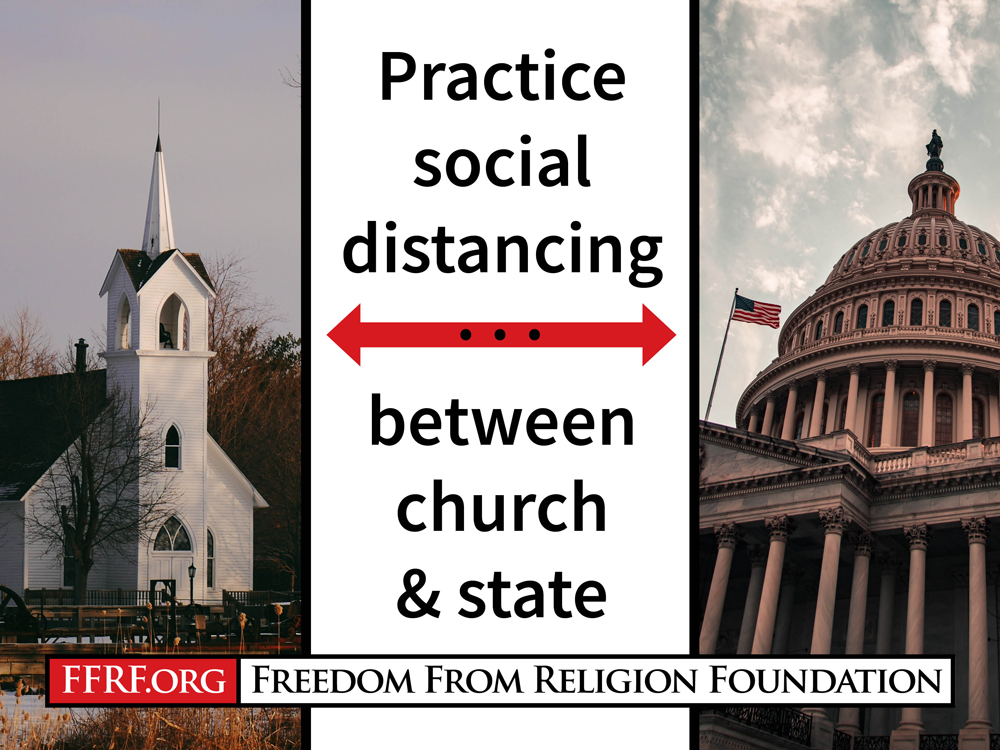
The Freedom From Religion Foundation is chiding the DA of a prominent California county for bestowing special status on houses of worship by exempting them from pandemic control measures.
Multiple concerned San Luis Obispo residents have reported to the national state/church watchdog that District Attorney Dan Dow is refusing to enforce California’s COVID-19 guidelines against churches, declaring San Luis Obispo “a sanctuary county for singing and praising in houses of worship.”
“Now more than ever in 2020, we need more people attending their houses of worship and seeking help from the Almighty for an answer to the coronavirus,” Dow has tried to explain his move. “In that spirit, I’m calling on people of faith in our county and across our state, across our country and across the world to pray for peace [and] healing.”
Even some religious leaders have expressed concern with Dow’s sanctuary county declaration.
Worshiping communities do not need sanctuary status, FFRF underscores. Sanctuary work is to protect immigrants from the dangers of torture, gang violence, murder or exile from their children. We must not encourage people of faith to imagine themselves as underserved, persecuted or criminalized during COVID-19.
FFRF is asking that the San Luis Obispo DA enforce the law and take action against all groups that hold illegal gatherings or engage in illegal conduct — including houses of worship.
“The Supreme Court has long held that the Establishment Clause ‘mandates government neutrality between religion and religion, and between religion and nonreligion,’” FFRF Staff Attorney Chris Line writes to Dow. “Exempting houses of worship from California’s COVID-19 guidelines violates this basic stricture.”
Americans have rights to worship and to assemble — but neither of those rights is unlimited. The government already regularly limits worship gatherings if they jeopardize public health. For instance, the government prohibits churches from cramming too many people into a building in violation of fire codes. Preventing the spread of a deadly virus is even more crucial.
More than 100 years ago, in a 7-2 opinion, the Supreme Court explained that stopping the spread of a deadly disease, smallpox, was more important to society than one individual’s religious rights (Jacobson v. Commonwealth of Mass. 1905). Prohibiting large gatherings and other activities that exacerbate the spread of the virus is not a ban on worship, as Dow has asserted. Churches and believers all over the country are worshipping alone, in small groups or even in large groups online. Coronavirus-related restrictions simply apply to unsafe activities, regardless of purpose. Framing California’s restrictions as a ban on worship would be like arguing that a speed limit is a ban on driving.
Houses of worship have been shown to be hotbeds for spreading COVID-19. One-third of all COVID-19 cases in a California county’s first coronavirus outbreak were traceable to a single church congregation, to give just one example.
Dow’s conferring of a special exception on Christian worshippers is a blatant act of favoritism. Nonreligious Americans make up the fastest growing segment of the U.S. population by religious identification — 35 percent of Americans are non-Christians, including the more than one in four Americans now identifying as religiously unaffiliated. The San Luis Obispo District Attorney’s office should not signal that it will give special treatment to houses of worship, sending a message of exclusion to residents, like FFRF’s complainants, who are not part of the religious majority.
“The DA is delinquent on a number of fronts,” says FFRF Co-President Annie Laurie Gaylor. “He is granting the worst sort of religious privilege — and he’s endangering the health and lives of numerous people in the process.”
The Freedom From Religion Foundation is a national nonprofit organization with more than 33,000 members and several chapters across the country, including over 4,500 members and a chapter in California. Its purposes are to protect the constitutional principle of separation between state and church, and to educate the public on matters relating to nontheism.